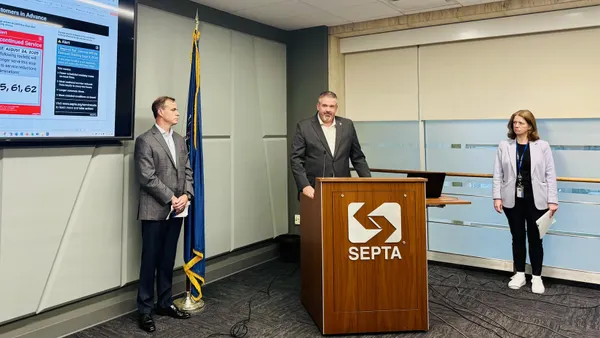Dive Brief:
- Lime announced Thursday a commitment for all fleet vehicles used for operations be zero emissions by 2030, marking the first micromobility company to make such a pledge. The fleet will be fully electric and charged with 100% renewable energy, the company said.
- Lime has around 350 vehicles in its fleet that it either owns or leases for distributing and rebalancing scooters and e-bikes, the company's Head of Sustainability Andrew Savage told Smart Cities Dive. Lime will look to bolster its charging infrastructure at warehouses and will use alternative vehicles, like zero emission trikes, to support redistribution.
- As part of its commitment, the company joined The Climate Group's EV100, a collection of businesses from around the world that look to build demand for electric vehicles (EVs) through advocacy and purchasing. Under the terms of EV100, members are required to submit an electrification roadmap within a year of joining, and are held accountable for meeting electrification targets.
Dive Insight:
Lime said that as electric scooters and bikes replace car trips and effectively cut emissions in cities around the world, this step will strengthen internal sustainability efforts.
"We have hundreds of thousands of riders already taking electric transportation via our scooters and e-bikes each week," Savage said, noting micromobility has replaced around 25% of car trips in cities surveyed by Lime. "They have come to depend on clean transportation for their daily lives, and we want to match this dependence with our daily operations."
E-scooters still account for considerable emission levels due to manufacturing and maintenance needs, as well as the need to use cars and vans to re-balance the fleets on city streets, according to a study last year from North Carolina State University. This move should help bring those emissions down quickly, even as doubts linger around scooters' long-term sustainability.
The company is aiming to hit the 100% EV target before 2030 and has been offsetting emissions associated with its fleet since fall 2018, Savage said. Beyond Lime, competitor Bird has also made strides, with the company's Sustainability Head Melinda Hanson telling Smart Cities Dive earlier this year that improvements in vehicle and battery technology will help reduce manufacturing costs and emissions.
Savage said that with micromobility still in its infancy compared to other forms of transportation, it has already greatly moved toward helping the environment.
"Scooter programs have only been operating for two years, but it's an industry that continues to strive higher and continues to make advancements to further our sustainability objectives," he said.










